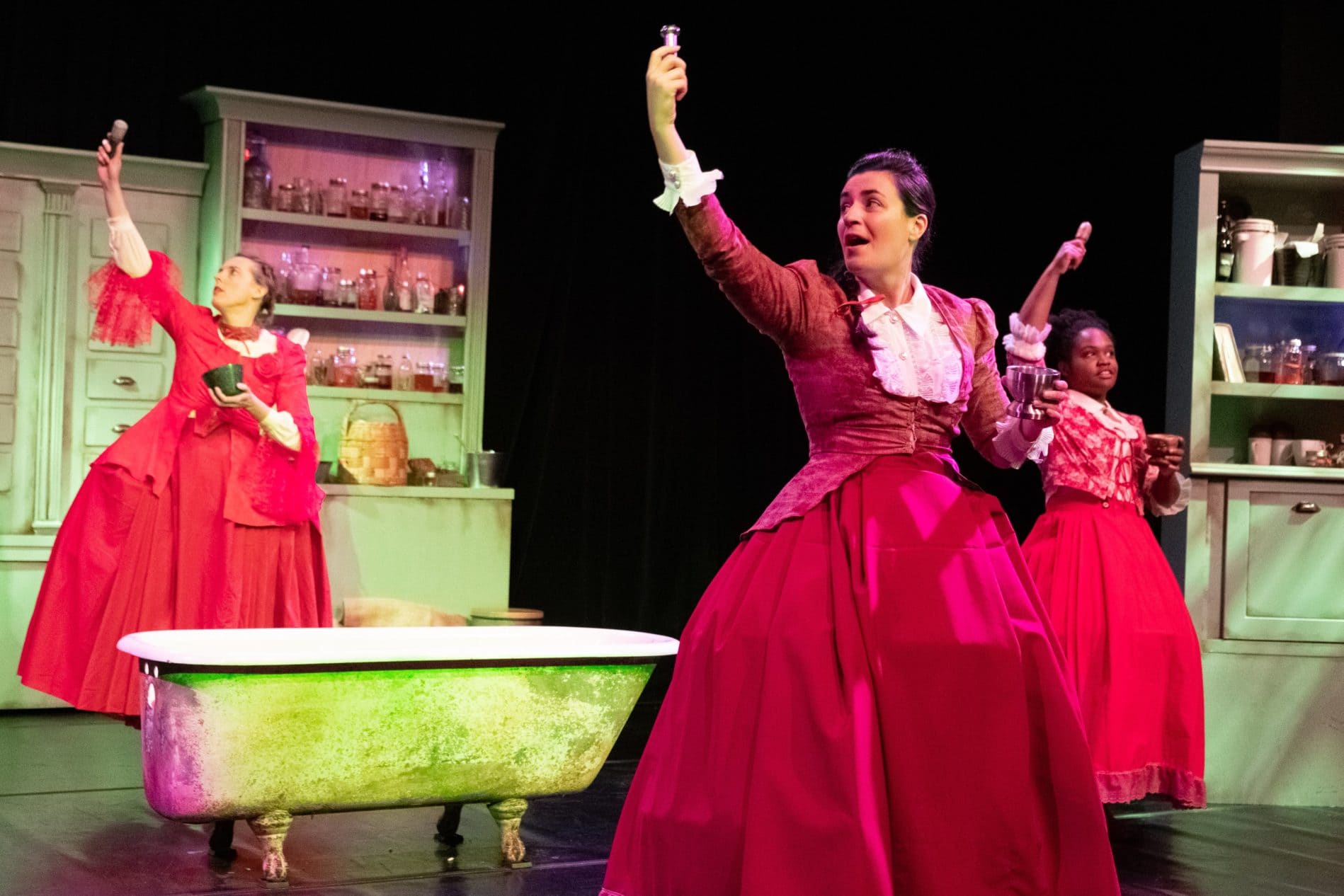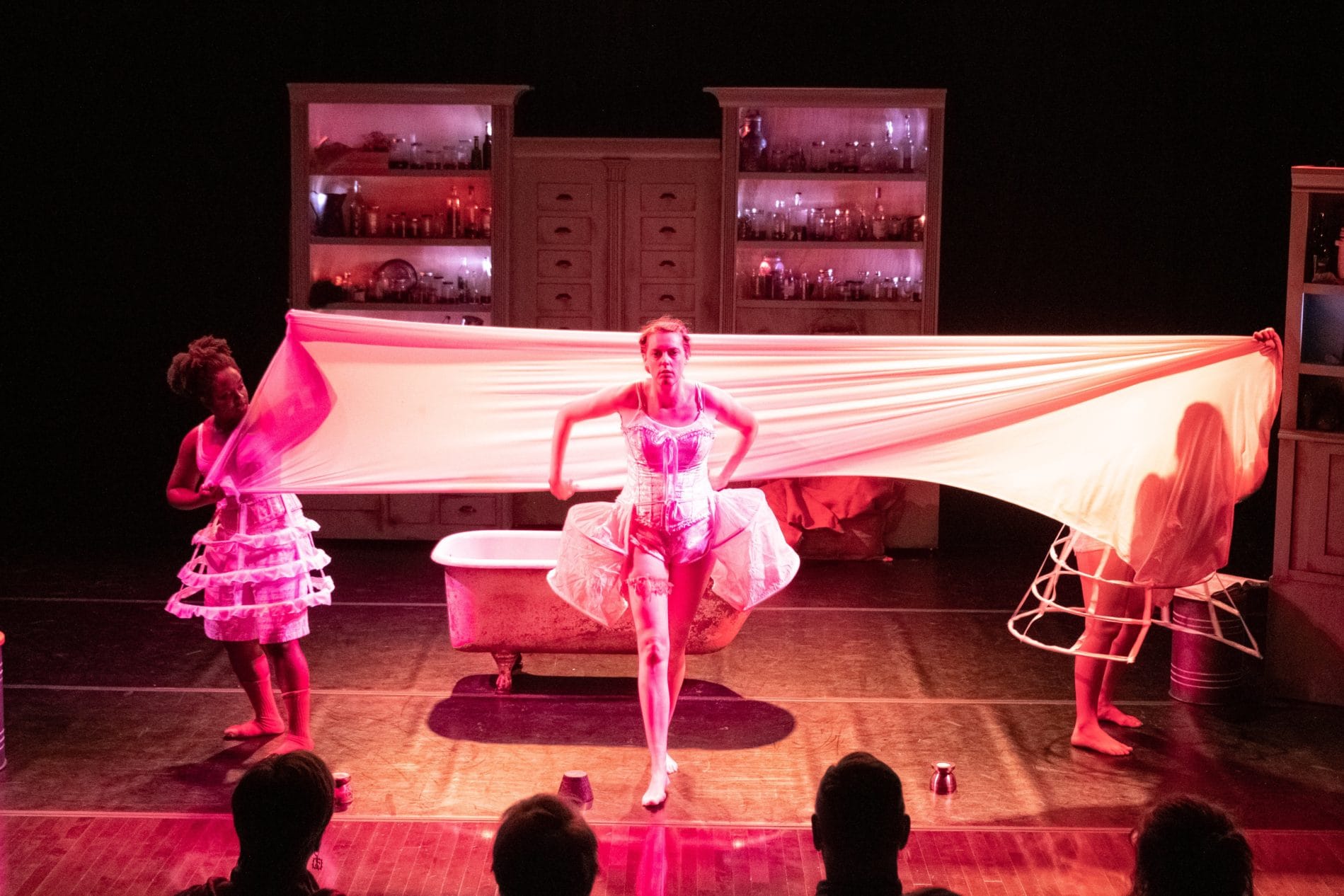When the audience enters the performance space at Joe’s Movement Emporium, they are confronted by three women in period clothing (costumes designed by Julie Cray Leong, assisted by Kyla Carney). The clothing is from indeterminate points in the past – one woman is dressed in vaguely 18th-century garb, another in Victorian style, and another in a hooped skirt and blouse. But these are period pieces in a more important way. They are red. And therein lies the theme of LadyM.
Periods. Menstruation.

The Welders’ Playwrights Collective members Rachel Hynes, Anastasia Wilson, Francesca Chilcote, Vanita Kalra and Claudia Rosales-Waters, began by musing on the character of Lady Macbeth, that bloody avatar of warped female power, examining “feminine violence, feminine ambition, and feminine blood, i.e. menstruation,” as the program note puts it.
Wanting to break the silence on the subject, through a grant from the DC Commission on Arts and Humanities, they interviewed and surveyed more than 400 people who menstruate to find out about their feelings, knowledge, and attitudes towards period bleeding. Their interview subjects (whom they scrupulously refer to as “menstruators” throughout, to emphasize the idea that not all women menstruate and not all menstruators are women) felt overwhelmingly relieved to be able to talk about a topic that is still largely taboo.
From these surveys and interviews and their own fertile imaginations, these creators devised an unusual show, performed by Hynes, Chilcote and Deirdre Staples. It runs the gamut from hysterically funny to bitingly angry to flowing and lyrical. It uses dance, clowning, comedy, spoken word, rhythm and music to explore just about every aspect of the menstruator’s experience. The performance is extremely amusing throughout, but also gives rise to some important musings.
When some red “Power Pumps” come sailing out onto the stage, the actors put them on and put an amusingly literal-minded spin on the advice that women are supposed to “lean in.” Then they draw a mammoth tape measure out of a bathtub and proceed to measure themselves and each other, fretting that they fall short; they then do the same to members of the audience, letting them know with “tsk, tsk” expressions and strained smiles that they just don’t fit these utterly arbitrary beauty standards (how long should the bill of one’s baseball cap be, exactly?). Then, they begin trying to market new kinds of tampons to the audience, each one more absurd than the last (“diamond-encrusted luxury!!!!”). All these satirize how media advice, images, and commercialism undermine the self-image and take advantage of menstruators.

Each actor has opportunities to shine: Chilcote dons a lab coat and is very proud of herself until she has to give a lecture on the nature of menstruation – without using any forbidden technical words. Each time she slips, frantic music begins to play (sound design by Cresent Haynes and Aaron Finkelstein), and she must substitute a cloying euphemism (like “love!” for menstrual blood, or “baby sack!” for uterus). Of course, her censored lecture is less than enlightening.
Staples, (who personifies Shakespeare’s line: “though she be but little, she is fierce”) performs a segment of powerful spoken word poetry. Hynes starts a stand-up comedy routine that seems to be veering into a genuine discussion of violence against women. Suddenly the lights (designed by Jon Medley) change, music swells, and Hynes finds herself performing a sexy dance, kind of a James Bond go-go girl routine – with a gun. She and the other women skewer every tired trope about femmes fatales and weapons in the movies, and it is gut-bustingly funny – until it suddenly turns deadly serious.
In another side-splitting movie parody, the actors wage a sanitary products war, with tampon projectiles and napkin shields. When Staples gets “shot” and the others are trying to “save” her, shouting “she’s bleeding! She’s bleeding!” the viewer realizes that, by contrast, menstruators bleed regularly, and everyone studiously ignores it. They are not lauded as heroes and given extraordinary treatment; they are shamed and shunned and dismissed as disgusting, and no undue efforts are made to ease their suffering, even though the continued life of our species is bound up in this blood sacrifice.
At one point, the piece takes a lyrical turn, when a flowing length of red chiffon appears and the women begin to dance with it. It somehow takes on all the possibilities of the menstruators’ experience: pain, hope, weakness, power, relief, disappointment, identity, connection, endings, and new possibility.
In the end, the women climb into the bath, intoning with Lady Macbeth,
“Come, you spirits … unsex me here, …. Make thick my blood,
Stop up th’access and passage …. Come to my woman’s breasts,
And take my milk.”
And here, in visible reality, rather than in the imagination as with Lady M, the blood increases instead of washing away. But unlike Shakespeare’s anti-heroine, these women revel in the blood and all it signifies. It turns out they are not so much Lady M, steeped in guilt, as the three witches, icons of female power and creativity.

But wait… there’s more. After the end of the performance, there is a segment called “Act 3 Interactive Installation” (even though the show is performed with no intermission). This part allows the audience to come up, meet the actors and creators, and take part in various efforts to bring menstruation out of the shadows, to (as they urge) #DestigmatizeMenstruation and #PeriodOutLoud.
Viewers can visit a “Period Product Petting Zoo” to see different kinds of sanitary products, including eco-conscious ones, and learn about charities that help get such products to menstruators who don’t have access to them. People can speak taboo words aloud into a mic, or post their period on a communal calendar, or join a “Red Table of Conversation.” And these activities are non-exclusionary. Everyone is welcome in the red tent. On opening night, the audience appeared to be at least a third non-menstruators (as much as one can guess by sight of course), which seemed very appropriate.
LadyM is a powerful piece of theatre about an important topic that has been hidden, shunned and shamed for far too long. But it doesn’t hector or preach. It is a loony – no lunar – laugh-fest that leads to some novel ways of looking at something half of us experience. If you are a menstruator or someone who cares about them, see this show.
Running Time: Approximately 1 hour with no intermission, plus variable time for audience interaction afterward.
The Welder’s LadyM plays through Saturday, July 27, 2019, at Joe’s Movement Emporium – 3309 Bunker Hill Road, in Mt. Rainier, MD 20712. For tickets, call (301) 258-6394, or purchase them online.




